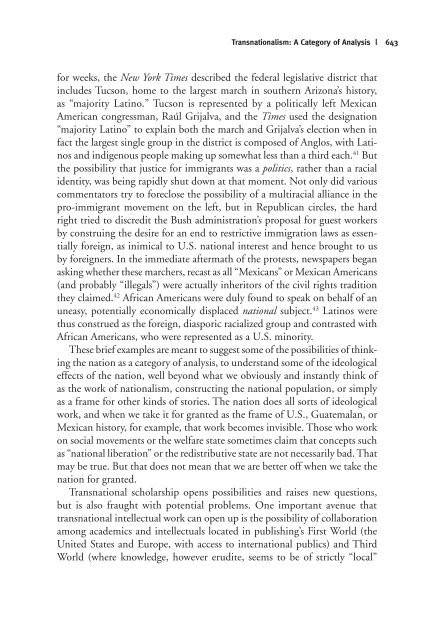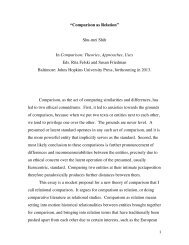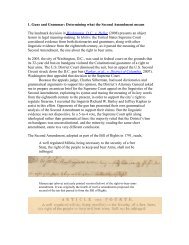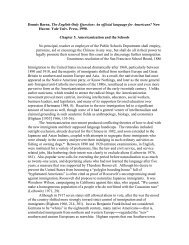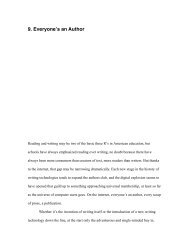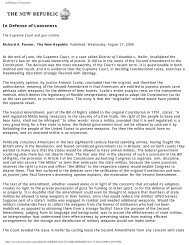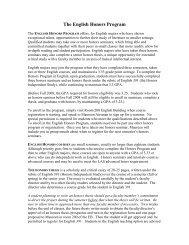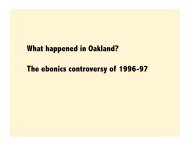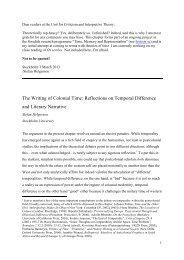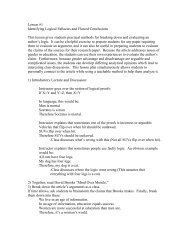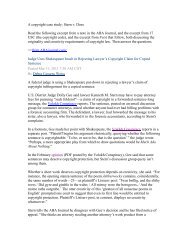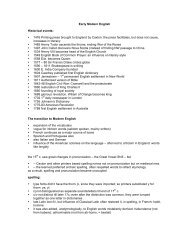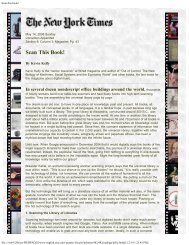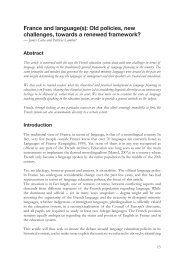Transnationalism: A Category of Analysis - Unit for Criticism and ...
Transnationalism: A Category of Analysis - Unit for Criticism and ...
Transnationalism: A Category of Analysis - Unit for Criticism and ...
You also want an ePaper? Increase the reach of your titles
YUMPU automatically turns print PDFs into web optimized ePapers that Google loves.
<strong>Transnationalism</strong>: A <strong>Category</strong> <strong>of</strong> <strong>Analysis</strong> | 643<br />
<strong>for</strong> weeks, the New York Times described the federal legislative district that<br />
includes Tucson, home to the largest march in southern Arizona’s history,<br />
as “majority Latino.” Tucson is represented by a politically left Mexican<br />
American congressman, Raúl Grijalva, <strong>and</strong> the Times used the designation<br />
“majority Latino” to explain both the march <strong>and</strong> Grijalva’s election when in<br />
fact the largest single group in the district is composed <strong>of</strong> Anglos, with Latinos<br />
<strong>and</strong> indigenous people making up somewhat less than a third each. 41 But<br />
the possibility that justice <strong>for</strong> immigrants was a politics, rather than a racial<br />
identity, was being rapidly shut down at that moment. Not only did various<br />
commentators try to <strong>for</strong>eclose the possibility <strong>of</strong> a multiracial alliance in the<br />
pro-immigrant movement on the left, but in Republican circles, the hard<br />
right tried to discredit the Bush administration’s proposal <strong>for</strong> guest workers<br />
by construing the desire <strong>for</strong> an end to restrictive immigration laws as essentially<br />
<strong>for</strong>eign, as inimical to U.S. national interest <strong>and</strong> hence brought to us<br />
by <strong>for</strong>eigners. In the immediate aftermath <strong>of</strong> the protests, newspapers began<br />
asking whether these marchers, recast as all “Mexicans” or Mexican Americans<br />
(<strong>and</strong> probably “illegals”) were actually inheritors <strong>of</strong> the civil rights tradition<br />
they claimed. 42 African Americans were duly found to speak on behalf <strong>of</strong> an<br />
uneasy, potentially economically displaced national subject. 43 Latinos were<br />
thus construed as the <strong>for</strong>eign, diasporic racialized group <strong>and</strong> contrasted with<br />
African Americans, who were represented as a U.S. minority.<br />
These brief examples are meant to suggest some <strong>of</strong> the possibilities <strong>of</strong> thinking<br />
the nation as a category <strong>of</strong> analysis, to underst<strong>and</strong> some <strong>of</strong> the ideological<br />
effects <strong>of</strong> the nation, well beyond what we obviously <strong>and</strong> instantly think <strong>of</strong><br />
as the work <strong>of</strong> nationalism, constructing the national population, or simply<br />
as a frame <strong>for</strong> other kinds <strong>of</strong> stories. The nation does all sorts <strong>of</strong> ideological<br />
work, <strong>and</strong> when we take it <strong>for</strong> granted as the frame <strong>of</strong> U.S., Guatemalan, or<br />
Mexican history, <strong>for</strong> example, that work becomes invisible. Those who work<br />
on social movements or the welfare state sometimes claim that concepts such<br />
as “national liberation” or the redistributive state are not necessarily bad. That<br />
may be true. But that does not mean that we are better <strong>of</strong>f when we take the<br />
nation <strong>for</strong> granted.<br />
Transnational scholarship opens possibilities <strong>and</strong> raises new questions,<br />
but is also fraught with potential problems. One important avenue that<br />
transnational intellectual work can open up is the possibility <strong>of</strong> collaboration<br />
among academics <strong>and</strong> intellectuals located in publishing’s First World (the<br />
<strong>Unit</strong>ed States <strong>and</strong> Europe, with access to international publics) <strong>and</strong> Third<br />
World (where knowledge, however erudite, seems to be <strong>of</strong> strictly “local”


